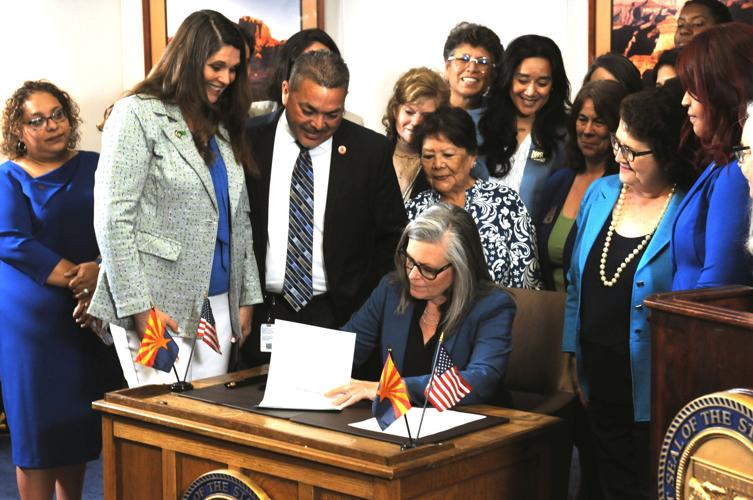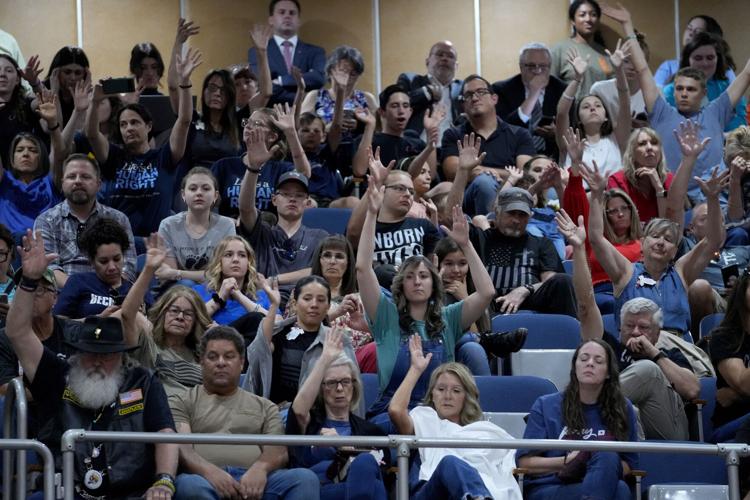PHOENIX — Democratic Gov. Katie Hobbs signed legislation Thursday to repeal a territorial-era abortion law, but it won’t take effect for months.
The focus shifts now to an initiative expected to be on Arizona’s November ballot to enshrine a broad right to abortion into the state’s Constitution. And the stage is set for a campaign that could cost at least $50 million.
Meanwhile, once the repeal of the 1864 law banning all abortions except to save the life of the mother eventually takes effect, that will leave a newer state law on the books, allowing abortion up to the 15th week of pregnancy.
The 1864 near-total ban was long dormant — until the Arizona Supreme Court ruled on April 9 that it trumps the newer law and can be enforced.
Various polls have suggested the initiative was a shoo-in if the only other choice for voters was to maintain the 1864 law that makes no exceptions for rape or incest.
But now, absent some unforeseen circumstances, it appears that by November that ban will be history, after a few Republicans in the GOP-controlled Legislature sided with Democrats to send the repeal to Hobbs for her signature.
Then, the law in Arizona will again allow abortion up until 15 weeks. And that’s a far different situation. In 2022, of the 11,407 pregnancies terminated in Arizona, 380 were beyond 15 weeks.
Put another way, maintaining a 15-week law allows 95% of all abortions to remain legal.
There are indications some Arizonans who oppose an outright abortion ban would be willing to support some restrictions.
In a 2022 survey after the U.S. Supreme Court overturned Roe v. Wade, OH Predictive Insights found 9% of Arizonans questioned wanted abortion to be illegal in all circumstances. By contrast, 50% said the procedure should be legal only under certain circumstances, a figure that dropped to 41% support for allowing abortions at all times.
“Does not undermine voters’ desire”

Gov. Katie Hobbs signs legislation Thursday to repeal the 1864 law that outlaws most abortions, though it cannot take effect for more than three months. Looking over her right shoulder are Rep. Stephanie Stahl Hamilton, the Tucson Democrat who sponsored the repeal bill, and House Minority Leader Lupe Contreras.
But a Tucson Democrat who sponsored the repeal measure signed Thursday by Hobbs, Rep. Stephanie Stahl Hamilton, said the fact that the 1864 law is virtually certain to be off the books by Election Day does not undermine voters’ desire to get government all the way out of the picture when it comes to abortion rights.
She pointed out that the initiative drive was launched last year, when state law allowed abortions until 15 weeks, long before the Arizona Supreme Court’s ruling allowing enforcement of the 1864 law.
That means those who already signed the initiative petitions — more than 500,000 so far according to sponsors — clearly do not think a 15-week limit is appropriate, Stahl Hamilton said.
Phoenix Democratic Sen. Anna Hernandez also said the push to enshrine broader abortion rights into the state Constitution remains necessary.
“Picking a 15 week or six weeks (limit), that’s all arbitrary,’’ Hernandez said.
The initiative not only would guarantee the right to terminate a pregnancy up to fetal viability, generally considered between 22 and 24 weeks, but also the right to an abortion to protect maternal physical or mental health.
“You cannot dictate and you cannot pinpoint when a complication of pregnancy’s going to happen,’’ said Hernandez.
“That’s why it is so important to get politicians out, get government out, and let that choice be between that person and the medical provider,’’ she said.
And she said the fact there was a contentious debate on the Senate floor Wednesday to repeal the 1864 law proves that point.
“The Republican leadership in Arizona has shown that they are unwavering in their desire to strip us of our right, our voices and our vote,’’ Hernandez said.
Republican legislative leaders have said they believe life begins at conception and they support the old law.
Also for voters to weigh
Something else that could be part of what voters consider: The restrictions that will remain under the 15-week law.
Beyond 15 weeks, abortions will be allowed under two exceptions: To save the life of the mother or for a “medical emergency.’’
The definition of a medical emergency is narrowly written, however, to say an immediate abortion would only be legal if a delay would “create serious risk of substantial and irreversible impairment of a major bodily function.’’
That is further defined as the immune system, normal cell growth and the “digestive, bowel, bladder, neurological, brain, respiratory, circulatory, endocrine and reproductive functions.’’
There is no exception in cases of rape or incest.
That’s appropriate, said Cathi Herrod, president of the anti-abortion Center for Arizona Policy, who is involved in the campaign to defeat the initiative.
Fifteen weeks provides enough time for any victim of either crime to terminate a pregnancy, Herrod said
By contrast, the initiative would allow all abortions up to fetal viability, and beyond that point not only to protect the life of the pregnant individual, but also to protect their physical or mental health, circumstances to be determined by them with their doctors and medical providers.
“Reproductive health care needs to be made available to all patients at all time, without the fear of criminalization,’’ said Stahl Hamilton. “And that is why we need to get this enshrined in our constitution.’’
Money pouring in
The campaign is generating big bucks.
Arizonans for Abortion Access, the group backing the initiative, already collected more than $12.3 million in a campaign that supporters have said could cost $50 million.
The biggest donor to date is The Fairness Project. The Washington, D.C. organization, which has a history of supporting ballot measures in states, already kicked in more than $4.1 million.
Herrod declined to say how much foes, operating under the banner of It Goes Too Far, intend to raise, saying only it will cost “a lot’’ to defeat the measure and keep the 15-week limit.
But so far, the opposition group has raised less than $525,000, including $100,000 from John Connelly, an attorney in Tacoma, Washington, whom Herrod said also has a home in Arizona, and an identical amount from David Lambert, a retiree from Tempe.
Focus for initiative foes
Opponents are focusing on what they believe are potential weak spots in the initiative to peel off voters.
Herrod cites a provision that would bar any law penalizing any individual for aiding or assisting a pregnant individual in exercising the right to abortion.
“The sex trafficker who takes his 14-year-old victim for an abortion to cover his crime would not face any consequences,’’ Herrod said. “When voters see that, they’re going to be outraged by that idea.’’
Dawn Penich, spokeswoman for the initiative proponents, disputed that point.
“I’m not going to even entertain the scandalous speculation of our opposition,’’ she said.
The whole purpose of that section, Penich said, is to ensure that “if a sister drove her beloved sister to the doctor that she wouldn’t be criminalized.’’ There are separate laws already dealing with sex trafficking and having sex with a minor, she said.
A closer call could be the question of whether the initiative would override existing laws that generally require a minor to get parental consent to terminate a pregnancy.
There already are exceptions in cases where a teen could convince a judge that she is mature enough to make that decision.
But the initiative declares that “every individual has a fundamental right to abortion’’ and does not narrow it to adults.
Penich said nothing in the initiative changes parental consent requirements.
“What it says is that patients, their medical providers and their families should be the ones making this decision exclusively,’’ she said.
“So that is a conversation for the patient, their family and their doctor,’’ Penich continued. “If a doctor feels that more people need to be looped into a situation, then that’s what the patient or the doctor will do.’’
She brushed aside a question of what happens if a minor patient and doctor conclude a parent does not need to be involved, saying that’s all part of “hypothetical speculations’’ by foes of the measure.






